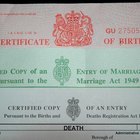
Emotional abuse is unfortunately a serious problem for many married women. If you feel degraded, unappreciated or fearful, or lack a strong sense of self, you may be a victim of emotional abuse. Emotional abuse is more difficult to recognize than physical abuse, and in fact, emotional abusers may have no idea that they are actually doing something that is wrong. The root of emotional abuse lies in the need to control and dominate, and some men assume this is their right and prerogative as a man.
Identify the primary characteristics of emotional abuse. On one level, emotional abuse is more difficult to identify and define than physical abuse. While physical abuse leaves bruises and injuries that are clearly visible and obvious, the damage and scars left by emotional abuse are less obvious. Some of the primary characteristics emotional abusers use against their victims include (1) isolating the victim from her family and friends, (2) discouraging independent activities, (3) accusing the victim of infidelity, (3) stonewalling - always disagreeing and refusing to grant validity the the victim's perspective or point of view and (4) using sex as a weapon. Your husband's motivation is to exercise power and control by emotional degrading you. As a result, you may suffer from feelings of anxiety and depression, lack self-confidence and feel unattractive and worthless.
Recognize the stages of abuse. Emotional abuse, like physical abuse, goes through stages. Once an abusive episode ends, you may often tell yourself that everything will be OK. Emotional abuse can be divided into four stages; (1) You realize that tension is building between you and your husband. You feel the need to placate your husband in an effort to ward off the abuse. (2) An episode of abuse occurs. This may involve shouting and threats, coldness and stonewalling, refusal to allow you to engage in an activity and so forth. (3) Your husband apologizes for the behavior. Often implicit in the apology is shifting the blame to you. (4) The relationship returns to a state of calmness after the apology, tempting you to forgive the abuse and think that it may not reoccur.
Seek support from family and friends. Insist upon your right to maintain a healthy relationship with your friends and family, and don't take no for an answer. Explain your situation to your more intimate friends and family members, and ask for their support. Encourage them to call, email and visit you personally.
Develop a strong sense of self and self-confidence. Seeking professional counseling with a qualified therapist is an important step in this direction. Joining a support group of women who are victims of emotional abuse also helps to work through and understand the issues related to emotional abuse and how it affects your self-identity. Always remember that you are not the source of the problem. The origins of abuse are rooted in the abuser's psychic, social and physiological histories.
Insist your husband seek professional help to deal with his abusive behavior. Emotional abuse not only affects the immediate victim, it has serious detrimental effects on children as well. Many abusers learn their abusive behavior patterns from their parents.
Related Articles

How to Overcome an Abusive ...

Forgiving Your Husband After Hurtful ...

How to Stop Finding Fault

Tips for Forgiving Your Best Friend

How to Deal With a Demanding Girlfriend

How to Recover and Heal in a Marriage ...

Signs of an Emotionally Abusive Husband

Signs That a Husband Is Thinking About ...

How to Deal With Judgmental People

How to Stop Being Overbearing to a ...

How to Apply for a Long-Form Birth ...

How to Fix a Relationship After Cheating

Excessive Jealousy & Possessiveness

10 Steps to Overcoming an Abusive ...

How Can a Wife Rekindle Her Marriage ...

Characteristics of Excessive Jealousy ...

How to Deal With Someone Who Always ...

How to Deal With the Silent Treatment ...

Silent Treatment Abuse

How Insecurity Can Ruin a Marriage
References
Writer Bio
Robert Russell began writing online professionally in 2010. He holds a Ph.D. in philosophy and is currently working on a book project exploring the relationship between art, entertainment and culture. He is the guitar player for the nationally touring cajun/zydeco band Creole Stomp. Russell travels with his laptop and writes many of his articles on the road between gigs.
Photo Credits
Hemera Technologies/AbleStock.com/Getty Images